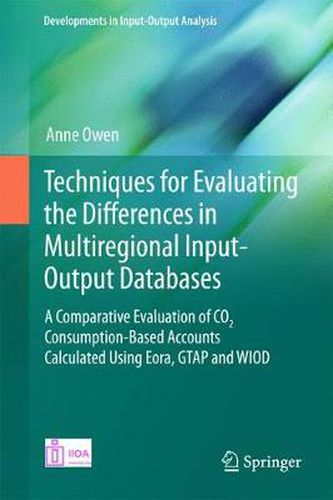Readings Newsletter
Become a Readings Member to make your shopping experience even easier.
Sign in or sign up for free!
You’re not far away from qualifying for FREE standard shipping within Australia
You’ve qualified for FREE standard shipping within Australia
The cart is loading…






This book introduces the Eora, Global Trade Analysis Project (GTAP) and World Input-Output (WIOD) databases and provides detailed metadata on the data sources, database structures and construction techniques used to build each system. It offers a detailed account of how multi-regional input-output (MRIO) databases are used to calculate consumption-based accounts - guiding the reader through each mathematical step and explaining the associated equations. It demonstrates that different MRIO databases calculate different national level consumption-based CO2 accounts. If these results are to be used as evidence in climate policy-making, analysts need to be confident about the accuracy of the databases and understand why the results differ.
It carefully explains the mathematical equations behind each technique and provides a link to a repository where the reader can access specially prepared MATLAB functions associated with the techniques.
To make meaningful comparisons between the three MRIO databases, each is mapped to a consistent classification system comprising 40 countries and 17 sectors. Further, readers can access the aggregated databases using the link provided. The effect of this aggregation is shown to be minimal, so readers can be confident that the aggregated versions of each database reflect the full-sized versions.
The book concludes by making recommendations as to how future MRIO databases could be accurately and consistently constructed and how they should be used in policy-making in light of the findings.
Endorsement
Anne Owen did a splendid job in comparing the most important Global Multiregional Input Output databases (GMRIO) available. She probably is the first to develop a good understanding what factors in GMRIO construction really contribute to uncertainties in carbon footprint analysis. A great achievement, packed in easy to understand language!Prof. Arnold Tukker Scientific director CML Leiden, NL
With its thorough investigations and clear explanations of the differences in MRIO databases and outcomes, this book is compulsory reading for both skilled practitioners and scholars when starting any input-output analysis in a multiregional context.
Dr. Harry C. Wilting Senior researcher, environment and economics PBL Netherlands Environmental Assessment Agency, NL
A novel exposition on understanding some of the biggest datasets underpinning current global sustainability assessments. Dr. Owen straddles technical incision with practitioner relevant insights and includes a range of methodological advances that will ensure the continued relevance of this work for many years to come. Prof. Richard Wood Industrial Ecology Program NTNU, Norway
$9.00 standard shipping within Australia
FREE standard shipping within Australia for orders over $100.00
Express & International shipping calculated at checkout
This book introduces the Eora, Global Trade Analysis Project (GTAP) and World Input-Output (WIOD) databases and provides detailed metadata on the data sources, database structures and construction techniques used to build each system. It offers a detailed account of how multi-regional input-output (MRIO) databases are used to calculate consumption-based accounts - guiding the reader through each mathematical step and explaining the associated equations. It demonstrates that different MRIO databases calculate different national level consumption-based CO2 accounts. If these results are to be used as evidence in climate policy-making, analysts need to be confident about the accuracy of the databases and understand why the results differ.
It carefully explains the mathematical equations behind each technique and provides a link to a repository where the reader can access specially prepared MATLAB functions associated with the techniques.
To make meaningful comparisons between the three MRIO databases, each is mapped to a consistent classification system comprising 40 countries and 17 sectors. Further, readers can access the aggregated databases using the link provided. The effect of this aggregation is shown to be minimal, so readers can be confident that the aggregated versions of each database reflect the full-sized versions.
The book concludes by making recommendations as to how future MRIO databases could be accurately and consistently constructed and how they should be used in policy-making in light of the findings.
Endorsement
Anne Owen did a splendid job in comparing the most important Global Multiregional Input Output databases (GMRIO) available. She probably is the first to develop a good understanding what factors in GMRIO construction really contribute to uncertainties in carbon footprint analysis. A great achievement, packed in easy to understand language!Prof. Arnold Tukker Scientific director CML Leiden, NL
With its thorough investigations and clear explanations of the differences in MRIO databases and outcomes, this book is compulsory reading for both skilled practitioners and scholars when starting any input-output analysis in a multiregional context.
Dr. Harry C. Wilting Senior researcher, environment and economics PBL Netherlands Environmental Assessment Agency, NL
A novel exposition on understanding some of the biggest datasets underpinning current global sustainability assessments. Dr. Owen straddles technical incision with practitioner relevant insights and includes a range of methodological advances that will ensure the continued relevance of this work for many years to come. Prof. Richard Wood Industrial Ecology Program NTNU, Norway